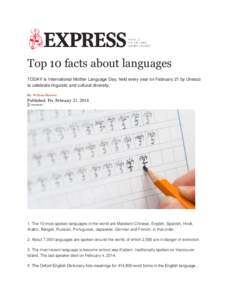<--- Back to Details
| First Page | Document Content | |
|---|---|---|
 Date: 2005-09-24 00:51:17Bilabial consonants Indigenous peoples in Brazil Pirahã people Daniel Everett Muran languages Linguistic relativity Universal grammar Glottal stop Rotokas language Linguistics Language Pirahã language |
Add to Reading List |
 | PDF DocumentDocID: 1lYxj - View Document |
 | ICPhS XVI Saarbrücken, 6-10 August 2007 ID 1668DocID: 18jKv - View Document |
 | Top 10 facts about languages TODAY is International Mother Language Day, held every year on February 21 by Unesco to celebrate linguistic and cultural diversity. By: William Hartston Published: Fri, February 21, 2014DocID: Aedq - View Document |
![UC Berkeley Phonology Lab Annual Report[removed]Commissioned for special issue of The Linguistic Review, 2008, Harry van der Hulst, ed.) Universals in Phonology Larry Hyman ABSTRACT This article asks what is universal ab UC Berkeley Phonology Lab Annual Report[removed]Commissioned for special issue of The Linguistic Review, 2008, Harry van der Hulst, ed.) Universals in Phonology Larry Hyman ABSTRACT This article asks what is universal ab](https://www.pdfsearch.io/img/9c425329c513929a192be159bdedbc91.jpg) | UC Berkeley Phonology Lab Annual Report[removed]Commissioned for special issue of The Linguistic Review, 2008, Harry van der Hulst, ed.) Universals in Phonology Larry Hyman ABSTRACT This article asks what is universal abDocID: 964y - View Document |
 | When Languages Die The Extinction of the World’s Languages and the Erosion of Human KnowledgeDocID: 3ilF - View Document |
 Cultural Constraints on Grammar and Cognition in Pirahã: Another Look at the Design Features of Human Language
Cultural Constraints on Grammar and Cognition in Pirahã: Another Look at the Design Features of Human Language